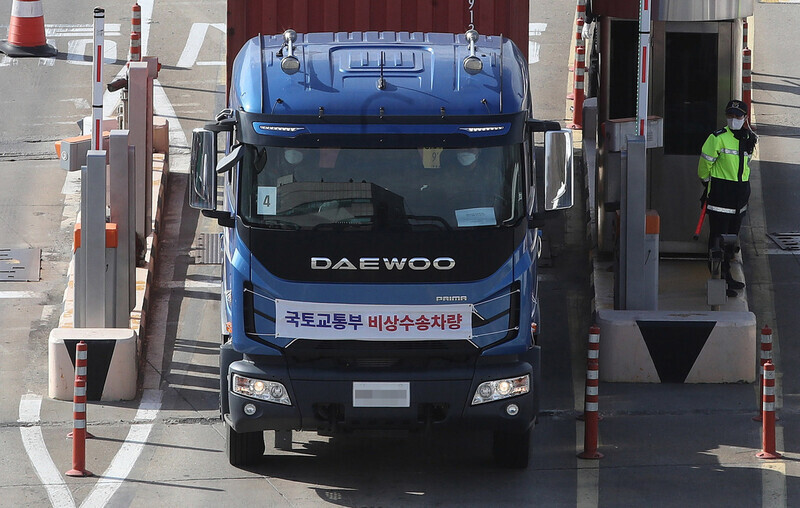hankyoreh
Links to other country sites 다른 나라 사이트 링크
Trucker strike brings Korea’s cement sector to brink of halt, putting others on alert

The cement industry is the first to be hard hit by the collective transport strike led by the Cargo Truckers Solidarity Division (TruckSol), which is affiliated with the Korean Confederation of Trade Unions (KCTU).
Disruptions in cement shipments are becoming increasingly apparent. If the strike goes on for more than a week, production may come to halt due to a lack of supplies. The steel and automobile industries are also seeing disruptions in shipments. In fact, the volume of container shipments entering and exiting major ports across the country has dropped sharply by 80% compared to usual figures.
On Monday, cement industry stakeholders met with Lee Chang-yang, the minister of trade, industry and energy, at Asia Cement’s plant in Jecheon, North Chungcheong Province, where they revealed that the ongoing strike, which began on Thursday, had cost their industry around 46.4 billion won in shipping disruptions as of Sunday.
The cement industry called for an early resolution to the situation, warning that “damage will spread in the next week or so, and could mean situations where production has to be stopped due to a lack of supplies.”
Lee said the government would “devise a plan to resume transportation and, if necessary, discuss and promote measures with relevant ministries related to minimizing damage, such as possibly using military vehicles [for transportation].”
According to data released by the Ministry of Land, Infrastructure and Transport on Monday, the container traffic volume at 12 ports across the country from 5:00 pm the previous day to 10:00 am on Monday totaled 7,587 TEU. This is just 21% of the daily average of 36,655 TEU recorded at the same 12 ports last month. Currently, container traffic at the ports of Gwangyang, Pyeongtaek-Dangjin, and Ulsan have been almost completely suspended.
Figures in the ready-mixed concrete industry claimed that production of ready-mixed concrete has been halted nationwide since Nov. 29, adding that they anticipate further disruptions at construction sites across the country.
The steel and automobile industries are also experiencing partial disruptions in shipments.
“We are experiencing an average of 50,000 tons of shipment disruptions per day,” an individual affiliated with Hyundai Steel told the Hankyoreh over the phone.
In the completed vehicle industry, there are no issues with the vehicles transporting parts to factories, but the car carrier trailers needed to transport completed cars have stopped operating.
As a result, company employees and part-time workers have been driving completed vehicles directly to shipping centers.
Meanwhile, although the shipbuilding, oil refining and petrochemical industries said they are not yet facing any major issues regarding the supply and demand of goods, there is still major concern about a prolonged strike.
Although the transportation of materials in the shipping industry is currently at a standstill, no problems have yet occurred due to measures taken in advance, such as stocking up on supplies.
“Because the strike was announced in advance, we received a lot of the necessary materials in advance,” a shipbuilding industry official said. “However, if the strike drags on, there is a high possibility that [ship] building will be disrupted,” the official added.
The oil refining industry is facing a similar situation.
“We are taking measures since there are some gas stations where supply is falling below 50% per tank,” an official in the oil refining industry said. “The average stockpile of gas stations is for two to four weeks, so an announcement was made before the strike that people should fill up their tanks. However, if [the strike] continues into the longer term, we don’t have any bright countermeasures up our sleeve,” the official added.
By Kim Young-bae, senior staff writer; Ahn Tae-ho, staff reporter; Choi Woo-Ii, staff reporter; Choi Ha-yan, staff reporter
Please direct questions or comments to [english@hani.co.kr]

Editorial・opinion
![[Column] Season 2 of special prosecutor probe may be coming to Korea soon [Column] Season 2 of special prosecutor probe may be coming to Korea soon](https://flexible.img.hani.co.kr/flexible/normal/500/300/imgdb/original/2024/0426/3317141030699447.jpg) [Column] Season 2 of special prosecutor probe may be coming to Korea soon
[Column] Season 2 of special prosecutor probe may be coming to Korea soon![[Column] Park Geun-hye déjà vu in Yoon Suk-yeol [Column] Park Geun-hye déjà vu in Yoon Suk-yeol](https://flexible.img.hani.co.kr/flexible/normal/500/300/imgdb/original/2024/0424/651713945113788.jpg) [Column] Park Geun-hye déjà vu in Yoon Suk-yeol
[Column] Park Geun-hye déjà vu in Yoon Suk-yeol- [Editorial] New weight of N. Korea’s nuclear threats makes dialogue all the more urgent
- [Guest essay] The real reason Korea’s new right wants to dub Rhee a founding father
- [Column] ‘Choson’: Is it time we start referring to N. Korea in its own terms?
- [Editorial] Japan’s rewriting of history with Korea has gone too far
- [Column] The president’s questionable capacity for dialogue
- [Column] Are chaebol firms just pizza pies for families to divvy up as they please?
- [Column] Has Korea, too, crossed the Rubicon on China?
- [Correspondent’s column] In Japan’s alliance with US, echoes of its past alliances with UK
Most viewed articles
- 1The dream K-drama boyfriend stealing hearts and screens in Japan
- 2‘We must say no’: Seoul defense chief on Korean, USFK involvement in hypothetical Taiwan crisis
- 3AI is catching up with humans at a ‘shocking’ rate
- 4S. Korea “monitoring developments” after report of secret Chinese police station in Seoul
- 5[Column] Can we finally put to bed the theory that Sewol ferry crashed into a submarine?
- 6[Editorial] Yoon cries wolf of political attacks amid criticism over Tokyo summit
- 7[Photo] “Comfort woman” survivor calls on president to fulfill promises
- 8Doubts remain over whether Yoon will get his money out of trip to Japan
- 9Up-and-coming Indonesian group StarBe spills what it learned during K-pop training in Seoul
- 10[Editorial] Was justice served in acquittal of Samsung’s Lee Jae-yong?